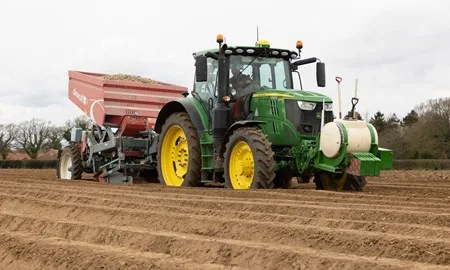Published on 1st February 2023
Pest Management
Velum Prime forms part of PCN best practice

The 2023 season will be Colin Henry’s third year applying Velum Prime (fluopyram), the liquid nematicide that can be used for both potato cyst nematode (PCN) and free-living nematode (FLN) control.
The 2023 season will be Colin Henry’s third year applying (fluopyram), the liquid nematicide that can be used for both potato cyst nematode (PCN) and free-living nematode (FLN) control.
Colin Henry - Greenseed International
Across 430 hectares of mainly salad varieties on the sandy soils that dominate the Breckland area of west Norfolk, Mr Henry has found Velum Prime to be easy means of protecting yields while managing nematode populations.
“As a salad grower, potato crops for the fresh market, can sometimes be lifted within 17 weeks of planting which precludes us from using fosthiazate granules because of the 17-week harvest interval. In this situation, Velum Prime is the only effective means of control,” Mr Henry says.
“Velum Prime is co-applied with Allstar (fluxapyroxad) in-furrow for control of black scurf (Rhizoctonia solani). The planters are fitted with four nozzles per row with two for Allstar and two for Velum Prime,” Mr Henry adds.
Most of the potato area is planted with Maris Peer and Gemson, both second early types, but there is also Jazzy and Annabelle , both first earlies. All varieties enjoy strong market appeal, but none have a resistance rating better than 2 for Globodera pallida. Only Annabelle has resistance to G. rostochiensis that can be considered meaningful with score of 8.
“We aim for rotations of one-in-seven but if on clean land and with the agreement of the landlord, we will grow on a one-in-six basis. We are fortunate with these rotations we have kept PCN populations in check.
Salad varieties account for 340 ha grown by Greenseed International on rented ground in west Norfolk with processing variety Arsenal planted on the land where PCN populations have been found to be a little higher.
“For historical reasons, we have several fields where the populations are higher. At 16-20 eggs per gram of soil these infestations may not be as high as recorded elsewhere, but we cannot afford to let them escalate,” Mr Henry says.
“On these fields, we have chosen to plant Arsenal, a crisping variety which has a G. pallida resistance score of 9 and 6 for G. rostochiensis. These fields will also receive Velum Prime, but it is prudent to plant varieties with good resistance when the opportunity allows,” Mr Henry says.
All potato land farmed by Greenseed International in west Norfolk is rented through long-term arrangements with local landowners. In similar situations, concern has been raised over the lack of control of volunteers and the impediments this can create to managing PCN populations over the long term. In a bid to overcome such concerns, Greenseed International has fitted crushers to all its harvesters while landlords understand the need to control any volunteers that emerge.
“The crushers mean that any potatoes that are returned to the soil should be incapable of producing a plant while we work with the landlords to monitor for volunteers. So far, it has been a successful policy,” Mr Henry says.


